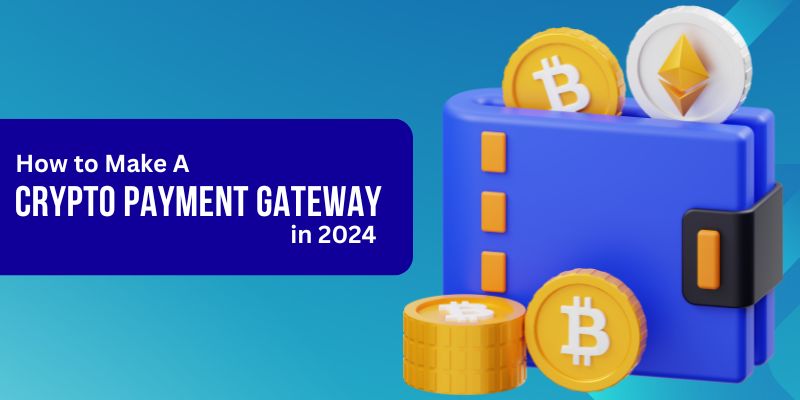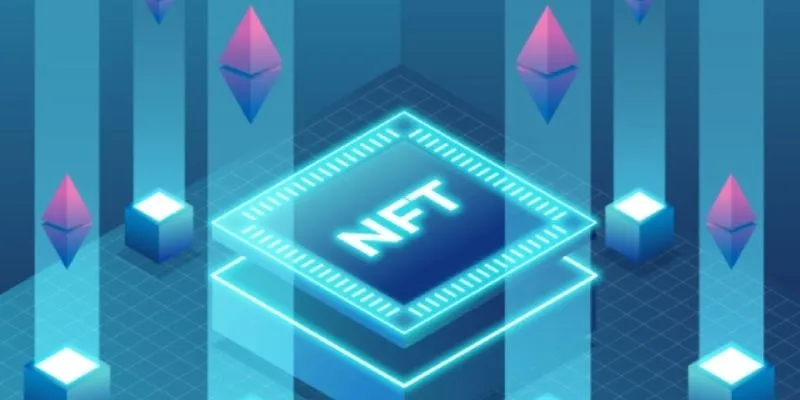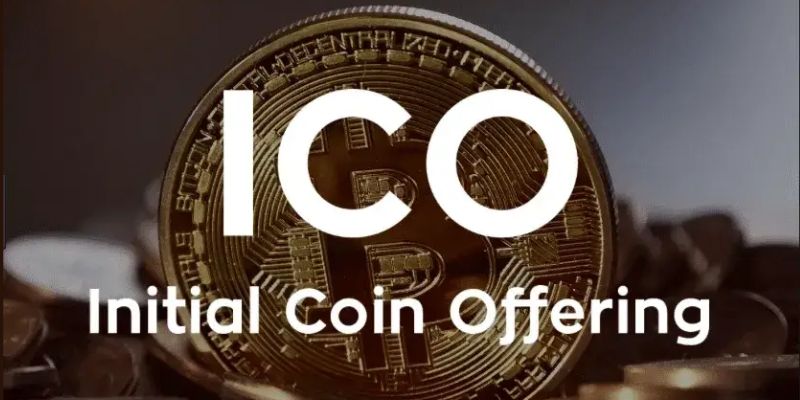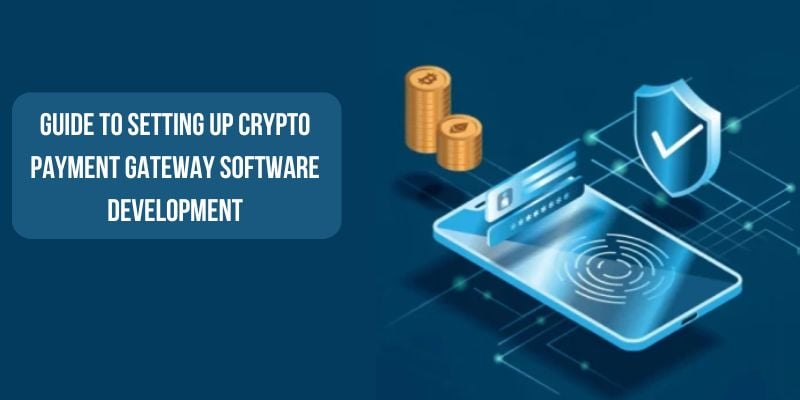Are you planning to create a cryptocurrency payment gateway? Cryptocurrencies have emerged as an unstoppable factor in the rapidly changing world of digital commerce. They offer a safe and secure option to traditional payment methods. One of the industry's pioneers, BitPay, has enabled businesses to accept Bitcoin payments.
Statista reports that cryptocurrency transactions will increase at a staggering Crypto Payment17% CAGR between 2022 and 2029 when their market value will reach $4.12 billion. This shows that the need for payment application development will double in the coming years.
However, creating a cryptocurrency payment gateway could be a challenging but rewarding job for those who require greater control or personalization.
If you're interested in building an online payment system, then read this blog until the very end. The blog will provide all aspects, including steps, cost, features, and other factors that can assist you in establishing the most reliable payment gateway.
So, let's begin.
What Is A Crypto Payment Gateway?
A crypto payment gateway is an intermediary payment processor that handles digital assets and cryptocurrencies, such as Ether or Bitcoin. Crypto payment gateway development company is a payment network that facilitates transactions between digital currencies, making transactions easier and speeding up the adoption of new methods.
Crypto payment gateway development company help consumers securely transact with Bitcoin and other cryptocurrencies. If they are looking for services to develop cryptocurrency, Users can quickly convert it into fiat currencies.
Payment gateways are additionally employed in cryptocurrency trading platforms and mobile apps. In turn, the need for Crypto payment gateways is growing at a rate of 2x.
How Does Crypto Payment Gateway Work?
Business owners who are knowledgeable about the operation of conventional payment gateways can comprehend how the Crypto payment gateway functions. It establishes the foundation for blockchain technology and replaces an electronic wallet to secure transactions.
Then, it was discovered that Crypto payment gateway development company operate transactions through a peer-to-peer system in which the payment details of the exchange nodes are transferred into the distributed ledger.
Steps to Develop a Crypto Payment Gateway Development Company
Are you looking to learn how to create a crypto-secure online payment system? This requires a complete understanding of the process to aid in the app's operation. Let's look at the step-by-step procedure the wallet app development service recommends.
Do Market Research and Analysis
Conduct thorough market research to establish a degree of interest in the crypto payment industry before proceeding. Look at apps such as Coinbase to learn their benefits compared to their drawbacks and factors that differentiate them. Additionally, consider variables such as user demographics, geographical areas, and verticals in the industry when selecting your market of choice.
Define Your Value Proposition
It is essential to define why your crypto payment method is distinct from the other alternatives. Offer a value proposition that customers and businesses will be looking for, such as lower fees, faster transfer speeds, or enhanced security features. How you present your platform's distinctive selling points will depend on how you convince people to use it.
Technology Stack Selection
To create your crypto payment gateway development company, select the appropriate mix of technology. Think about how it interacts with various Blockchain networks, IDO, and ICO launchpads, how quickly it can expand, and how secure it is. According to your requirements, you can utilize blockchain technology to develop a custom solution or opt for an existing blockchain platform, such as Ethereum. For the best results, it's better to seek help from an expert in cryptocurrency development.
Design Intuitive UI/UX
Be sure that the payment method you choose is user-friendly to ensure that both businesses and buyers enjoy a pleasant experience. To satisfy everyone's requirements, you should offer options like tracking real-time transactions, tools for sending invoices, and various payment options. The design should also be more compatible with phones and computers so that the platform will meet the growing number of users who use it in this manner.
Developer API and Documentation
After developing your user interface, the next stage of creating an online payment system that uses crypto is creating APIs and documents so that developers and sellers can easily connect the two.
This will make it easier for businesses to integrate your payment method on their apps or websites. Fintech app development firms require clear and easy instructions to know how to implement the features their platforms require.
Testing and Quality Assurance
To identify and correct potential security flaws, bugs, and speed issues, you should make an effort to conduct thorough tests. To ensure the payment process is secure and reliable, it is essential to conduct tests on integration, unit testing, and security tests. Customers and sellers will appreciate a rigorous quality assurance process, which can lead to widespread use.
Launch and Marketing
After complete testing, create your crypto payment gateway, and your app is fully functional. Plan a campaign to inform people about it and attract customers and businesses. Utilize connections, marketing content, and social networks to connect with members of Bitcoin's community.
To encourage people to join swiftly, offer incentives like special deals or rates. To remain at the top of the cryptocurrency market, it is essential to regularly upgrade and enhance your platform according to user feedback.
Features to Develop a Crypto Payment Gateway
If you are developing a crypto payment platform, the features factor pops into your mind. They make your e-wallet payment application more effective and profitable. Therefore, we have laid out the essential elements that should be included in your crypto e-wallet app development.
-
-
User Registration
-
Conversion to Fiat Currency
-
User Authentication & Security
-
Real-time Transaction Monitoring
-
Secure Wallet Integration
-
API Integration
-
Payment Gateway Integration
-
Dashboard
-
Merchant Tools
-
Multi-cryptocurrency Support
-
Ticket Generation
-
User Registration
The registration feature allows users to create an account by entering personal information such as their name, number, or email ID. It ensures security and accessibility to control transactions and digital assets.
Conversion to Fiat Currency
The capability to convert crypto to fiat cash offers sellers a variety of options. It is an excellent option for those who prefer conventional currencies. This makes it simpler to integrate crypto payments into mobile banking app development.
User Authentication & Security
Engaging skilled developers to incorporate data encryption, KYC verification, and two-factor authentication is recommended to increase the security of your payment gateway against unauthorized access and protect user accounts from internet fraud.
Real-time Transaction Monitoring
Merchants and customers can effortlessly monitor transactions in real-time. This allows consumers to track what is happening with their transactions and provides rapid resolution of any problems that might arise. This transparency increases confidence.
Secure Wallet Integration
The crypto payment gateway's security is an essential function that allows users to keep and manage their bitcoins securely. With the assistance of a mobile application developer service provider, they can incorporate secure banking wallet functions to protect customers' electronic assets through solid encryption and secure storage techniques.
API Integration
This feature allows businesses to connect crypto-based payment systems to other platforms. This allows companies to incorporate them much more efficiently, thereby increasing the usability and accessibility of this payment method.
Payment Gateway Integration
With the integration of payment gateways, users are able to select any payment method for cryptocurrency transactions. This allows users to safely accept a variety of cryptocurrencies, which will make it easy for both users and merchants.
Dashboard
The central platform for users is a complete dashboard that provides an instant overview of the activities in your account, transaction statuses, and associated data. The intuitive data visualization, extensive transaction logs, search options, and the ability to classify improve transparency and control of the consumer over their financial information.
Merchant Tools
Companies can manage transactions more efficiently by utilizing merchants' tools. These include tools to monitor transactions, review sales data, personalize payment options, and streamline retailers' payment processes.
Multi-Cryptocurrency Support
If you are developing a crypto payment system, incorporate multi-currency crypto payment gateway support features to facilitate transactions in cryptocurrency. This allows customers to select their own currency, which helps attract a broader range of customers interested in various digital assets and enhances the payment gateway's effectiveness.
Ticket Generation
Effective ticket creation systems permit users to get help or file complaints immediately. User-friendly interfaces allow users to create tickets and track their progress live, increasing customer satisfaction and confidence in the support system.
If you know the benefits of crypto-based payment gateways, it's the best time to discuss with a blockchain-related development company such as JPLoft to integrate such features into your application.
Things to Consider for Crypto Banking Payment Gateway Development
When establishing the payment platform to develop crypto banking, The following tips will help companies move in the proper direction.
Have a Clear Vision and Purpose
After you've made the intelligent decision to build a crypto-based online payment system, it is crucial to define the vision of your product. Do you prefer the "hands-off" approach, where customers' funds are not kept in your account, or a "hands-on" approach involving custodial storage? The latter is more complicated and involves costs and greater complexity, especially regarding security and infrastructure charges. It is, therefore, crucial to establish the level of responsibility you're willing to take on and the appropriate budget for your cryptocurrency payment gateway.
Understand Regulatory Landscape
Understanding regulatory requirements poses an immense challenge in developing crypto-banking payment solutions. First, it involves examining the regulatory frameworks in the countries of interest and understanding the implications of cryptocurrency transactions.
Let us think of a scenario in which an organization based in Europe seeks to use cryptocurrencies to expand into Asia. While compliance with local Anti-Money Laundering (AML) requirements is sufficient in France, it doesn't necessarily translate to other countries.
The regulatory environment surrounding cryptocurrency is diverse, even within a single area. Japan is a prime example. It is a big fan of Bitcoin and other digital currencies and boasts some of the world's most innovative regulatory systems. In contrast, nations such as China and Vietnam have banned digital currency transactions, highlighting the need to pay close attention to the regulatory nuances of every targeted market.
Identify Banking Partnerships
Picking a bank partner is essential in creating crypto-based payment solutions. If a bank uses cryptocurrency, it usually risks being rated as high by payment platforms like Visa or Mastercard. Therefore, anticipate the need for designated full-time Equivalents (FTEs) to look for banks willing to work with.
Set Yourself Apart
Due to the high rise competition in the market, it is vital to differentiate your product from the competition. This might mean providing multi-currency crypto payment gateway functions for obtaining exclusive privileges like official endorsements, or accessing supportive banks that are not accessible to others. Do a thorough study of competitors to find the areas where you can distinguish yourself as a crypto-banking service provider.
Feature to Integrate
Choosing features for a top-of-the-line crypto payment gateway rests on balancing customer convenience and internal administrative needs. Things like exchange management processes, including rates and liquidity, controls, and reporting, should be considered carefully. The most important considerations are:
The Number of Cryptocurrencies
While supporting multi-currency crypto payment gateway sounds appealing, it is essential to understand its technical implications. Since blockchain technology is the foundation of cryptocurrency, developing an online payment system that can support several cryptocurrencies will require the integration of multiple blockchains. It is possible to focus on popular cryptocurrencies such as Bitcoin, Ethereum, and Litecoin to dedicate resources to developing specific features.
Payment Methods
Knowing customers' preferences regarding payment methods is crucial to avoid feature overload and reduce time to market. Provide only the necessary payment options, such as debit and credit cards, that meet customers' requirements.
Cryptocurrency Exchange Rate Management
Implementing an equivalence fee structure based on the number of transactions will improve customer satisfaction and encourage more transactions. Automating the fee gradations and providing customized discounts for significant transactions will simplify operations and increase customer satisfaction.
Payment Automation
Real-time conversion between fiat and cryptocurrencies is essential in the current cryptocurrency climate to reduce risk. Automated payment cancellation and dynamic recalibration systems improve transaction efficiency and reduce operational complexity.
Best Crypto Payment Gateways
It is crucial to be aware of rivals and their USPs. This is why we have listed some well-known crypto payment gateways for you to consider.
-
-
Coinbase
-
Paypal
-
Paxful
-
Binance
-
Trust
-
1. Coinbase
A crypto exchange platform like Coinbase has over 9 million active monthly users. This wallet lets users buy, transfer, sell, or store cryptocurrency and tokens. Users can also be sure their wallet is safe as it is secured to ensure they don't lose their money or passwords to hackers.
2. Paypal
Paypal is a further well-known payment gateway with more than 435 million active customers. Businesses accept credit and debit cards, and PayPal authorized debits and credits via PayPal's Payflow Gateway APIs. If you want to develop a payment system for your company, consider investing in developing the Paypal application.
3. Paxful
Users can purchase or trade digital currencies with other users on Paxful. Users can go for cryptocurrency exchanges and earn cash in a secure, protected environment according to Paxful's commitment to financial equality. They also encourage ICO advancement, encouraging equity in the crypto market.
4. Binance
The Binance app allows users to transfer cryptocurrency. Customers must complete the KYC requirements before trading. Binance is a renowned cryptocurrency payment platform with a 150 million user base worldwide.
5. Trust
Trust Wallet is a crypto payment gateway development company that offers users full access to crypto assets, including ICO tokens and cryptocurrency exchanges that cannot be converted into cash. Its main cryptocurrency tool is the Trust Tool, which is compatible with 65 blockchains and provides users access to more than 4.5 million crypto assets.
Cost To Develop a Crypto Payment Gateway
The price for developing an online payment gateway for crypto ranges between $10,000 and $20,000, but this varies based on the particular specifications and functions you'd like to have. You can choose a scratch-based or white-label crypto payment gateway. If you decide to create your own from scratch, every step of creation will begin starting from scratch. You are the person who will bring your ideas to your company. It can be beneficial; however, it can take too long to begin your crypto-related project. Furthermore, your crypto payment gateway will be costly and out of your financial budget.
On average, developing entirely from scratch can cost $25,000 to $1,00,000. A highly competent team of developers is required to help you accomplish this. Therefore, it is better to choose the other method, a white-label crypto payment gateway. White label is essentially the pre-fabricated or fully developed software of an already well-known crypto payment gateway software that can be installed instantly.
An expert pool and developers will work on this application, allowing you to modify it to your specifications and then begin using it. If you require additional security or features, you could also incorporate them. The cost of a white-label crypto payment gateway could be as high as $10,000. Adding additional features can cost between $3000 and $5000.
Plan Out The Way Your Cryptocurrency Payment Processor Will Integrate Into The Marketplace
Analyzing the market needs you're interested in is essential to determine if your product will be sought-after. For instance, Morocco is one of the countries most dependent on cash. Seventy-one percent of the population needs to be banking. Yet 84% of the population have access to the internet. Therefore, if you're trying to get your message out to potential customers from Morocco, it is simpler to do so using cryptocurrency. The fact that Morocco is now referred to as the world's most renowned cryptocurrency-trading country only confirms that point.
Explore The Details of The Regulations
Understanding the regulations' requirements is among the most challenging aspects of designing a crypto payment gateway software. In the beginning, you must research the laws of the countries you're interested in and learn how they manage operations using cryptocurrency.
For instance, you're in Europe and would like to utilize crypto to enhance your business's capabilities in your Asian market. If you've worked with a payment gateway that uses crypto in France in which it is sufficient to be registered as an official firm and meet local AML obligations, however, that doesn't mean the same rules can be applied to a different jurisdiction.
The perception of cryptocurrencies could vary within a specific area (as the case is with Asia) and not to mention other continents. For example, Japan recognizes Bitcoin and other digital currencies as legally owned property and is the country with the most advanced regulation of cryptocurrency. However, China and Vietnam have banned cryptocurrency transactions.
Find Banks Willing to Collaborate With
Selecting a bank to join is often the most significant obstacle to the crypto-based advancement of payment gateways. If a bank begins to work in cryptocurrency, it will receive an extremely high-risk score from the payment methods (Visa, Mastercard, etc.) on which it depends. You may need an FTE or two to find banks willing to collaborate. Another option is to benefit from forming a partnership with a consultant firm.
Determine What Can Make You Different From Others
Your concept of "the best crypto payment gateway" was already conceived by a different company; however, you're reinventing the wheel. To create an appropriate solution, you need to differentiate your company from other businesses through your gateway's unique features or specific privileges, like government assistance or a dependable bank. Look at your competition's advantages and disadvantages to determine how your solution could differentiate.
Be Aware Of The Costs Of Maintaining a Cryptocurrency Payment Gateway System
The crypto-gateway is tightly connected to various services that ensure its functioning. We'll discuss this in more depth later, and that's why you need to keep track of all the integrations.
Conclusion
Ultimately, the growing importance of crypto-based payment gateways in DeFi represents an essential moment in advancing finance. Through seamless integration of the DeFi platform and other e-commerce solutions, delivering extensive support and documentation, and building infrastructure for future expansion, payment gateways are set to transform the way we trade and interact with digital assets.
When we think of the future, adopting crypto payment gateway software can open the possibility of an uncentralized financial system, allowing businesses and consumers alike to support the potential of blockchain technology to achieve financial freedom and creativity.













Share this blog